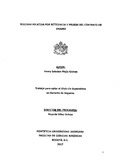Nulidad relativa por reticencia y prueba del contrato de seguro

Fecha
2017Autor(es)
Mejía Gómez, Henry EstebanPublicador
Pontificia Universidad Javeriana
Facultad
Facultad de Ciencias Jurídicas
Programa
Especialización en Derecho de Seguros
Título obtenido
Especialista en Derecho de Seguros
Tipo
Tesis/Trabajo de grado - Monografía - Especialización
Compartir este registro
Citación
Documentos PDF
Resumen
Al observar el último inciso del artículo 1058 de Código de Comercio resulta importante analizar, cuál es el alcance de la obligación de conocer el real estado del riesgo, pues, aunque la aseguradora debe obrar con alto grado de diligencia profesional, también es necesario resaltar, el postulado de la ubérrima buena fe aplicable al contrato de seguros. Por ello es importante establecer hasta dónde debe llegar la obligación de la aseguradora de obrar con diligencia, si se contrapone con la obligación que también le asiste al tomador, de obrar de buena fe, específicamente en la declaración de asegurabilidad. Al respecto se puede concluir, que existe el deber por parte del tomador de informar sinceramente el estado del riesgo y que la carga de diligencia del asegurador apunta a un deber de buscar información sobre el estado del riesgo, pero en la medida de lo posible y de las circunstancias que rodea cada asunto, y sin hacer mucho más cuantioso y dispendiosa la actividad aseguraticia, sin que se pueda justificar en ningún momento las falsas declaraciones.
En cuanto a la prueba del contrato de seguro, es posible acreditar la existencia del mismo mediante un documento en el que se adviertan sus elementos esenciales (el interés asegurable, el riesgo asegurable, la prima o pago del seguro y la obligación condicional del asegurado), pero sus condiciones pueden ser demostradas con cualquier medio de prueba idóneo, sin limitarse al escrito o a la confesión.
Abstract
When observing the iast paragraph of Article 1058 of the Commercial Code, ¡t ¡s important to analyze, what ¡s the scope of the obligation to know the real State of the risk, even though it is true that the insurer must act w¡th a high degree of professional diligence, ¡t ¡s necessary to highlight, the postúlate of the utmost good faith applicable to the contract of ¡nsurance. For this reason, ¡t ¡s important to establish the extent to which the insurer’s obligation to act with diligence should be met, if it conflicts with the obligation that also assists the policyholder to act in good faith, specifically in the declaration of insurability. In this regard it can be concluded that there is a duty on the part of the policyholder to truthfully inform the State of risk and that the burden of diligence of the insurer points to a duty to seek information about the State of the risk, but as far as possible and considering the circumstances surrounding each case, without making the Insurance activity much more expensive and costly, and without being able to justify at all the false statements.
As for the proof of the contract of insurance, it is possible to prove the existence of it by means of a document in which it’s essential elements are noticed (the insurable interest, the insurable risk, the premium or payment of the insurance contract, and the conditional obligation of the insured), but, it's conditions can be demonstrated with any suitable means of proof, without being limited to writing or confession.
Palabras clave
SeguroReticencia
Prueba del contrato
Verificación del estado del riesgo
Nulidad relativa
Keywords
InsuranceReluctance
Relative Nullity
Proof of the contract
Verification of the rísk status
Temas
Especialización en derecho de seguros - Tesis y disertaciones académicasRiesgos (Seguros)
Seguros
Nulidad (Derecho)
Estadísticas Google Analytics

